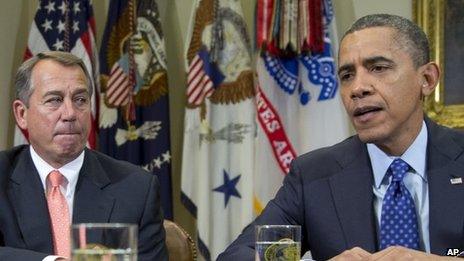US fiscal cliff: Death, taxes and the GOP
- Published

US politicians have been negotiating furiously to try to resolve the fiscal cliff
Benjamin Franklin, one of the United States' founding fathers, observed that there are only two certainties in life - death and taxes.
For nearly a quarter of a century we've been able to cling to another certainty, namely that the Republican Party, would never raise taxes. Never.
Since 1990 no Republican in Congress has voted to increase anyone's income tax.
Through three recessions, two booms and three wars the right wing of US politics has held fast to its most important economic principle: taxes must never, ever rise.
Big changes?
Well, all that may be about to change.
The signs aren't necessarily clear, and there aren't that many of them, but it's impossible to watch the US political debate right now without wondering if some big changes are underway.
Most of that debate revolves around the package of spending cuts and tax hikes that will go into effect on 1 January 2013.
The so-called "fiscal cliff" is, partly, America's latest self-imposed deadline for cutting government spending and/or increasing taxes so that its deficit and debt don't eventually consume the economy.
Given the Republicans' refusal ever to raise taxes, the assumption would normally be that government spending would be cut.
The trouble is that the only way you could eliminate the deficit just with spending cuts would be changing the public health scheme for senior citizens in ways that would be described as "profound" or "savage" depending on your political beliefs.
That's before you get to the defence budget.
In short, the arithmetic of the deficit makes it nearly impossible for Republicans to stick to their tax guns much longer.
New tone
The Republicans' leader in Congress, John Boehner, offered the first sign that the hard line might be eroding.
After the election he said, "We're willing to accept some additional revenue via tax reform," citing "loopholes" that could be closed.
On the face of it this may not seem a major concession, but it was a new tone for Republican leaders.
During the Republican primary campaign, the final 10 candidates for the party's presidential nomination declared that as president, they would refuse to accept even $1 of increased revenue in exchange for $10 of spending cuts.
Media voices
Then there is the media.
Right-wing outlets have been dominated lately by a debate over how, or if, the Republicans' pitch to voters must change.
Newsnight economics editor Paul Mason explains why the fiscal cliff matters not just to the US but also to Europe.
Voices have been heard suggesting the Grand Old Party might need a brand new approach to economic policy.
The editor of the Weekly Standard, William Kristol stated, "It wouldn't kill the country if we raise taxes on millionaires."
To the Republican Party of the last 20-plus years, that's heresy.
Or there's Steve Forbes, publisher and editor-in-chief of Forbes magazine.
In a recent op-ed, external, writing about the suggestion that US tax rates should be returned to the levels of the 1990s, he says, "Absolutely, let's do it."
Such peculiar - for the right wing - comments have led some to suggest that maybe, just maybe, Republican politicians are about to vote for some kind of tax increase.
Norquist factor
No one should count on it yet, though.
There's still Grover Norquist to contend with, and Grover Norquist, of all people, knows something about holding Republicans to their tax promises.
His pressure group, Americans for Tax Reform, was created in 1986 and ever since has been prevailing on Republican officials to sign a pledge to voters never to raise income taxes or corporate taxes, never even to end tax breaks without guaranteeing a matching cut in rates.
Individuals who break the pledge find themselves challenged from within their own party, by challengers heavily backed by the Norquist organisation.
Norquist usually wins.
The pledge's absolutist quality is now out of tune with the more accommodating noises of some on the right.
Undaunted, Norquist has been everywhere, attempting to hold the line.
He rejects the notion that the Republican Party is undergoing any softening of its traditional economic stances.
"The modern Republican Party is infinitely stronger in its economic positions that it was two years ago," he says.
The 95%
Norquist also mocks the notion that the current negotiations to rein in the deficit mean taxes are going up, one way or another.
"Well that's what Obama is hoping for, but that's what he hoped two years ago."
"He ended up extending [the currently reduced tax rates] for two years and I think that's the most likely outcome again."
Some 95% of Republican congressmen and women have signed Norquist's pledge.
Clearly he thinks (or hopes) that even if some are tempted to abandon it there can't possibly be enough of them to end the Republicans' remarkable run of resisting tax increases.
But another near certainty in all of this is that come the new year, if we're reporting that some kind of deal has been struck to constrain America's deficit, then somehow the Republicans will have broken with one of the essential tenets of their faith.
It may not be too much to say that an era of economic policy will have ended.
What the new American politics looks like after that is anything but certain.